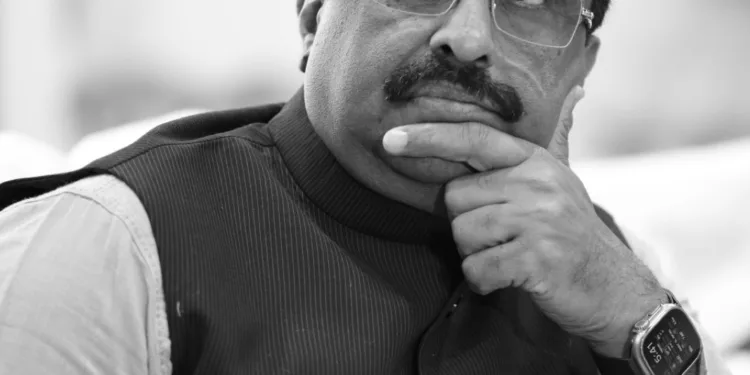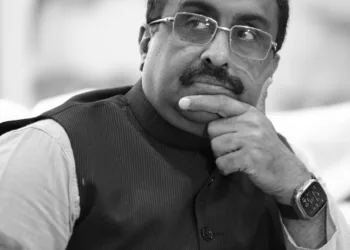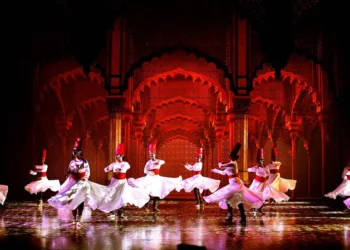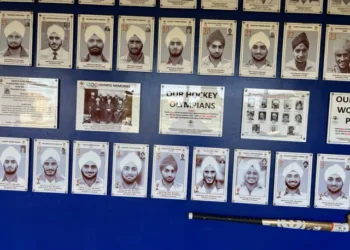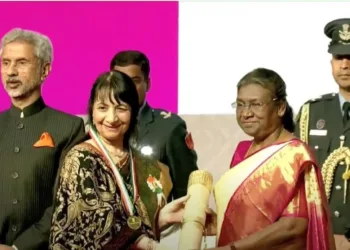A politician, social leader, author and thinker, Dr Ram Madhav is currently president of India Foundation, a New Delhi-based Think Tank, which saw major national and multilateral initiatives in decade of its existence like the Indian Ocean Conference, the Dharma-Dhamma Conference, ASEAN-India Youth Summit and Counter Terrorism Conference involving various heads of nations and leaders of governments besides academics, scholars and public-spirited individuals. Most recently, Dr Madhav has been instrumental in ideating the Religon-20 Forum (R20) as part of G20. Having served as national General Secretary of the Bharatiya Janata Party, Ram Madhav is currently a member of the National Executive of the Rashtriya Swayamsevak Sangh and has authored several books. Here is Dr Ram Madhav in a free-wheeling interview with Rajesh Kumar. Excerpts…
Q: With majority of the BJP’s agendas completed, what is the next plan of action?
Ans: Much to everyone’s contentment, the upcoming agenda for the government has repeatedly been articulated by the Prime Minister & his team – to build a Viksit Bharat. So, next 20 years would be focussed on building a Viksit Bharat i.e., a developed Bharat.
Viksit Bharat need not necessarily mean only economically-developed Bharat. By Viksit Bharat, we mean to create a prosperous country, a united country & a very strong country. A country that is respected globally, a situation wherein every citizen of the country is respected across the world. We intend to build a clean & a corruption-free country.
You have to build a country where every citizen upholds civic responsibility. We visualise that kind of Bharat. That’s what Prime Minister meant when he said ‘We have to build a Viksit Bharat’. In my opinion, every nationalist would aim to build a Viksit Bharat for next 20 years and that should be the agenda for every citizen as well.
Q: What message does the building of a grand Ram Mandir convey to the world? Instead of inspiring confidence among different communities, will it not instil fear among other communities? Will the world community accept it?
Ans: Please recall the Rath Yatra of Shri Advani Ji in 1989-90. Right from the beginning, Ram was always held as a unifying factor. In fact, Ram is the greatest unifier of our country. So, we never saw the Ram Mandir as a movement against any community, against minority or anything on those lines. Now that the magnificent Ram temple has come up, we must proudly highlight the fact that 160 million people contributed towards building it which included a large number of Muslims, Christians, Communists, and a large number of those who probably do not believe in Ram or in God itself. But everybody, in one voice, saw in it the resurgence of the national spirit. Therefore, Ram Mandir movement was not based on any sectarian agenda at all.
This is why even your PRAVASI INDIANS magazine carried a story with the headline ‘A Cultural Renaissance’. So, our view is that Ram Mandir will create unity in the country, not division. That is the spirit of this Ram Mandir.
Q: Do you think Ram Mandir would promote tourism and boost local economy in Ayodhya? Do you think Ram Mandir would contribute to the broader goals of cultural heritage preservation and conservation?
Ans: Naturally! India is a land of tirthas (sacred places). All those sacred places attract large number of pilgrims. In a way, yes, it is spiritual tourism, some may call it religious tourism & others may call it pilgrim tourism. Ayodhya will definitely be at the centre of such tourism.
But seeing Ram Mandir purely as mere structure or structural parapet would be a great injustice to the magnificent temple that has come up in Ayodhya. Of course, at one level, it would be a tourism booster which would spur the local economy. But larger purpose behind is that it upholds the nation’s dignity and honour. Everybody feels immense pride about one’s cultural identity. Whether it is Varanasi or Ayodhya or any such places, they always help promote tourism. For example, let me talk about Tamil Nadu, where no new temple is coming up. However, temple tourism is one of the major revenues for the Tamil Nadu government.
Q: With Ram Mandir in existence, would it set any cultural narrative for India?
Ans: Oh, that is the cultural narrative. Ram is India’s symbol of ancient Indian value system, also called Dharma which is the greatest unifier of our country. India is a diverse country but what keeps us united is this value system.
Ram Mandir epitomises that value system. And, our next target is not building another temple, but building Ram Rajya, which runs on the principle of great Indian value system, which imparts everybody equal respect, extending equal benefits of development and welfare to the last person in the society, which is called ‘Antyodaya’. Last man should lead a happy life that’s the kind of Bharat we want to build, which we call Viksit Bharat, that is Ram Rajya.
Q: There are reports that PM doesn’t listen to RSS. How is the relationship between Modi Ji and RSS?
Ans: Prime Minister listens to 1.4 billion citizens of our country which obviously includes RSS as well. He listens to every good suggestion that comes from any corner, from RSS or wherever. His office is the most open Prime Minister’s Office in independent India’s history. He even responds to personal recommendations & suggestions. This is what thousands of our citizens have experienced. So, to say that he doesn’t listen to RSS or anybody else is not factually correct. All the necessary interaction happens.
Q: Nitish deserted you many times and spit venom against RSS/BJP. Yet Nitish was taken back. Amit Shah’s remarks “नीतीश बाबू, आपके लिए भाजपा का दरवाजा हमेशा के लिए बंद हो चुका है” went viral? What’s your take on BJP alliance in Bihar? Comment please?
Ans: No, I cannot comment on BJP’s political alliances. But it is an established fact that in politics, no principle of untouchability works. Politics is where alliances happen, people break, come together, these things keep happening more often than not.
Q: ‘Democracy’ and ‘personality cult’ can’t go together? Do you see Modi becoming a cult figure? Your comment?
Ans: No, popularity and cult are not the same things. It is a totally wrong representation of Prime Minister’s popularity. See, a leader who enjoys great popularity is always an asset not only for the party but even for the country. But every popular leader need not be viewed as creating a cult. It is not a cult. He is popular because of the good work he has done for the people, for his personal connect with the people.
Haven’t we heard of his Man Ki Baat when prime minister talks every month on radio? He has revived the radio culture, which had almost become obsolete in our country. So, radio culture is back today. And millions and millions of people listen to him on radio every month. He connects with the people. That connect need not be called ‘personality cult’. He doesn’t promote his personality cult. Instead, he actually promotes greater connect with the people and listens to people. That’s why he is very popular.
Q: Advani Ji was conferred Bharat Ratna recently. Was it not a belated recognition? But, RSS had almost disowned Advani Ji for praising Jinnah then. Your comment?
Ans: One may say belated, but then one can say ‘better late than never’. It is good that Advani Ji’s great contribution has been recognised by the current government. And he was conferred Bharat Ratna recently. You must note that Advani Ji was quite active in politics until few years ago. As his age advanced, he was in the party’s Margdarshak Mandal and he continues to be there. Yes, he is relatively less active in politics now.
Naturally when you are active in politics, such awards are not given immediately. He is undoubtedly a big statesman and he was conferred this award at the appropriate time.
As regards his remarks about Jinnah, it is a very old issue. We had issued clarifications then. When a leader goes to another country or visits a particular place, certain protocols are followed. Those protocols do not amount to policies. In this case, he had undertaken a visit to Jinnah’s mausoleum, and made some remarks as part of protocol. It was in fitness of things at that point of time.
Q: When do you see J&K elections? Anything concrete towards Kashmiri Pundits rehabilitation?
Ans: Remember, J&K has had elections in the last three years in local bodies, in village panchayats, in district bodies & in mandal bodies. This year, parliamentary election is scheduled to happen.
As regards the question about the assembly polls, the delimitation process has been completed recently. Now, the assembly elections will also happen sooner than later in J&K. Let us wait for an appropriate time.
About Kashmiri Pandits rehabilitation, it is an ongoing process. In the last four or five years, especially since Mr Manoj Sinha has taken over as LG, a concerted effort has been made to provide employment to more and more Pandits. As far as I know, 7000/8000 jobs were created especially for them. Pandits are slowly and gradually moving back to the Valley. We need to ensure both safety and dignity for them to return to the Valley.
Not just safety, dignity also is required. Not just dignity, safety also is required. So, the effort is on to create an atmosphere in the Valley for their return with safety and dignity.
Q: Since you have been actively associated with North-east, what solutions do you foresee for Manipur?
Ans: What we witnessed in Manipur in the last few months is extremely unfortunate. Manipur, which has three major different communities, had these fault lines for several decades now. It is not something new that has suddenly come up. The major challenge is to balance peace and those fault lines simultaneously.
When the administration failed to manage those fault lines, such kinds of eruption happened. That’s what happened, it’s unfortunate though. But I think Manipur government and Home Ministry together are making efforts and would soon restore normalcy soon.
Q: How do you see the role of India Foundation in putting India on the global map?
Ans: See, India Foundation is a think tank. We sometimes call it as a ‘do’ tank. The priorities of our country and the government are also our priorities. How we take these messages far and wide is important. We operate on three areas: International Relations, Strategic Studies, and Security Studies. In these three areas, we have set certain priorities for the government.
We align ourselves with those priorities and try and take that message far and wide through this intellectual ecosystem, academia, media, think tanks, and all such things. So, the role of India Foundation is taking forward the message of our country beyond frontiers. The real challenge is for us to manage the narrative about India outside. There is often a gap between what we are and the narrative being said outside. In fact, latest edition of your PRAVASI INDIANS magazine carried an article on perception. What we need is perception correction. We need to do away with that anomaly.
We are doing the right things here but sometimes, things are conceived or perceived wrongly. So, India Foundation actually plays an important role in that perception correction. Naturally, India Foundation’s role is mostly outside. In fact, our flagship events attract dozens of ministers. Recently, we had an Indian Ocean Conference, which was held on February 8-9, 2024 at Perth in Australia, and attended by 20 Foreign Ministers including India’s External Affairs Minister. The India story was conveyed to all the 20 foreign ministers effectively.
So, that is how we try and convey India’s story far and wide in the world. Good that PRAVASI INDIANS magazine is also working towards carrying a good perception about India. So, are we doing.
Q: Shouldn’t we join hands then?
Ans: Oh! definitely. My best wishes to you! PRAVASI INDIANS magazine can also be an important instrument in spreading this good narrative about our country, especially through Pravasi Bharatiya community which though exists in 190 countries but are pro-active in about 100 countries today. Thanks to the efforts of Prime Minister Modi & BJP, they have become very active. So, they can become transmitters of this good message & your magazine can be an effective instrument for the same.
Blurb-1
The government’s upcoming agenda – to build a Viksit Bharat – has repeatedly been articulated by Prime Minister & his team. So, next 20 years would be focussed on building a Viksit Bharat.
Blurb-2
Now that a magnificent Ram temple has come up, we must highlight the fact that 160 million people, including a large number of Muslims, Christians, Communists, and a large number of those who probably do not believe in Ram or in God itself, contributed towards building it.
Blurb-3
Ram is India’s symbol of ancient Indian value system, also called Dharma which is the greatest unifier of our country. India is a diverse country but what keeps us united is this value system, which treats everyone equally, extending equal benefits of development and welfare to the last person in the society.
Blurb-4
We may do right things but sometimes, things are conceived or perceived wrongly. So, India Foundation actually plays an important role in that perception correction. The priorities of our country and the government are also our priorities. How we take these messages far and wide is important.


